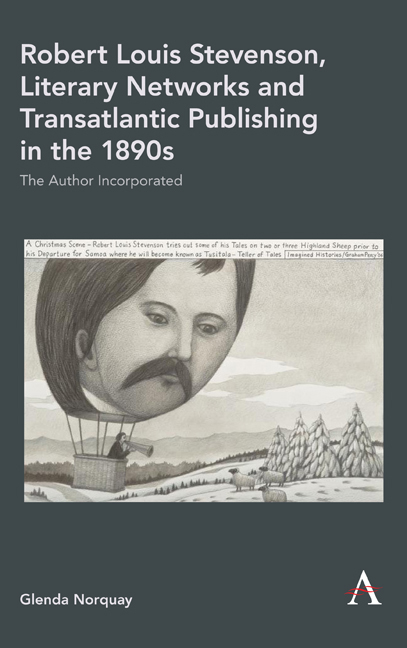18 results
26 - Catherine Carswell: Qpen the Door!
-
-
- Book:
- A History of Scottish Women's Writing
- Published by:
- Edinburgh University Press
- Published online:
- 24 September 2020
- Print publication:
- 03 February 2020, pp 389-399
-
- Chapter
- Export citation
Acknowledgements
-
- Book:
- Robert Louis Stevenson, Literary Networks and Transatlantic Publishing in the 1890s
- Published by:
- Anthem Press
- Published online:
- 16 February 2020
- Print publication:
- 31 January 2020, pp vii-x
-
- Chapter
- Export citation
1 - Lemuel Bangs: ‘The Senator’
-
- Book:
- Robert Louis Stevenson, Literary Networks and Transatlantic Publishing in the 1890s
- Published by:
- Anthem Press
- Published online:
- 16 February 2020
- Print publication:
- 31 January 2020, pp 29-52
-
- Chapter
- Export citation
References
-
- Book:
- Robert Louis Stevenson, Literary Networks and Transatlantic Publishing in the 1890s
- Published by:
- Anthem Press
- Published online:
- 16 February 2020
- Print publication:
- 31 January 2020, pp 207-222
-
- Chapter
- Export citation
Introduction
-
- Book:
- Robert Louis Stevenson, Literary Networks and Transatlantic Publishing in the 1890s
- Published by:
- Anthem Press
- Published online:
- 16 February 2020
- Print publication:
- 31 January 2020, pp 1-28
-
- Chapter
- Export citation

Robert Louis Stevenson, Literary Networks and Transatlantic Publishing in the 1890s
- The Author Incorporated
-
- Published by:
- Anthem Press
- Published online:
- 16 February 2020
- Print publication:
- 31 January 2020
5 - Family, Friends and Collaborators
-
- Book:
- Robert Louis Stevenson, Literary Networks and Transatlantic Publishing in the 1890s
- Published by:
- Anthem Press
- Published online:
- 16 February 2020
- Print publication:
- 31 January 2020, pp 131-160
-
- Chapter
- Export citation
2 - A Tale of Two Texts
-
- Book:
- Robert Louis Stevenson, Literary Networks and Transatlantic Publishing in the 1890s
- Published by:
- Anthem Press
- Published online:
- 16 February 2020
- Print publication:
- 31 January 2020, pp 53-80
-
- Chapter
- Export citation
3 - ‘A Gentleman Called Charles Baxter’
-
- Book:
- Robert Louis Stevenson, Literary Networks and Transatlantic Publishing in the 1890s
- Published by:
- Anthem Press
- Published online:
- 16 February 2020
- Print publication:
- 31 January 2020, pp 81-98
-
- Chapter
- Export citation
Frontmatter
-
- Book:
- Robert Louis Stevenson, Literary Networks and Transatlantic Publishing in the 1890s
- Published by:
- Anthem Press
- Published online:
- 16 February 2020
- Print publication:
- 31 January 2020, pp i-iv
-
- Chapter
- Export citation
Index
-
- Book:
- Robert Louis Stevenson, Literary Networks and Transatlantic Publishing in the 1890s
- Published by:
- Anthem Press
- Published online:
- 16 February 2020
- Print publication:
- 31 January 2020, pp 223-230
-
- Chapter
- Export citation
Abbreviations
-
- Book:
- Robert Louis Stevenson, Literary Networks and Transatlantic Publishing in the 1890s
- Published by:
- Anthem Press
- Published online:
- 16 February 2020
- Print publication:
- 31 January 2020, pp xi-xii
-
- Chapter
- Export citation
Conclusion: Robert Louis Stevenson Incorporated
-
- Book:
- Robert Louis Stevenson, Literary Networks and Transatlantic Publishing in the 1890s
- Published by:
- Anthem Press
- Published online:
- 16 February 2020
- Print publication:
- 31 January 2020, pp 199-206
-
- Chapter
- Export citation
6 - Arthur Quiller-Couch: The Quivering Needle
-
- Book:
- Robert Louis Stevenson, Literary Networks and Transatlantic Publishing in the 1890s
- Published by:
- Anthem Press
- Published online:
- 16 February 2020
- Print publication:
- 31 January 2020, pp 161-186
-
- Chapter
- Export citation
7 - Richard Le Gallienne: ‘Not While a Boy Still Whistles’
-
- Book:
- Robert Louis Stevenson, Literary Networks and Transatlantic Publishing in the 1890s
- Published by:
- Anthem Press
- Published online:
- 16 February 2020
- Print publication:
- 31 January 2020, pp 187-198
-
- Chapter
- Export citation
Contents
-
- Book:
- Robert Louis Stevenson, Literary Networks and Transatlantic Publishing in the 1890s
- Published by:
- Anthem Press
- Published online:
- 16 February 2020
- Print publication:
- 31 January 2020, pp v-vi
-
- Chapter
- Export citation
4 - Sidney Colvin: Custodian and Monument
-
- Book:
- Robert Louis Stevenson, Literary Networks and Transatlantic Publishing in the 1890s
- Published by:
- Anthem Press
- Published online:
- 16 February 2020
- Print publication:
- 31 January 2020, pp 99-130
-
- Chapter
- Export citation
11 - Kate Atkinson: Plotting to Be Read
- from Part III - Postmodernism, Globalisation and Beyond
-
-
- Book:
- The Contemporary British Novel Since 2000
- Published by:
- Edinburgh University Press
- Published online:
- 20 December 2017
- Print publication:
- 17 January 2017, pp 119-128
-
- Chapter
- Export citation



